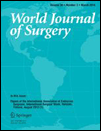Association Between Serum Thyrotropin Concentration and Growth of Asymptomatic Papillary Thyroid Microcarcinoma
Abstract
Background
Thyrotropin (TSH) is a known thyroid growth factor. Several studies have suggested its potential role in carcinogenesis and the progression of differentiated thyroid carcinoma. We have been conducting a prospective trial of nonsurgical observation for asymptomatic papillary thyroid microcarcinoma (PMC) since 1995. The aim of this study was to investigate whether serum TSH concentrations can be used to predict PMC growth.
Methods
This study examined 415 asymptomatic PMCs. Three hundred twenty-two patients decided to undergo nonsurgical observation by ultrasonography and were followed for ≥2 years.
Results
After a mean of 6.5 years of observation (range 2–22 years), 25 lesions (6 %) had increased in size, 377 (91 %) showed no change and 13 (3 %) had decreased in size. Both baseline TSH and mean TSH during follow-up for PMC that increased in size did not differ significantly from those lesions that were unchanged or decreased in size. Increases in size were seen in 0 of 18 (0 %), 15 of 260 (6 %), 10 of 126 (8 %), and 0 of 11 (0 %) for PMCs with baseline TSH < 0.50, 0.50–1.99, 2.00–3.99, and ≥4.00 mIU/L, respectively. A logistic regression model analyzing the association between baseline TSH and outcome showed an odds ratio of 1.01 (95 % confidence interval [CI], 0.66–1.29). No significant correlations were apparent between mean TSH during follow-up and change in PMC volume (r = 0.019, p = 0.70).
Conclusions
No significant association between TSH and tumor progression was verified during the nonsurgical observation trial for PMC. TSH is not a good predictor of PMC growth.
Conflict of interest
The authors have no conflicts of interest.




